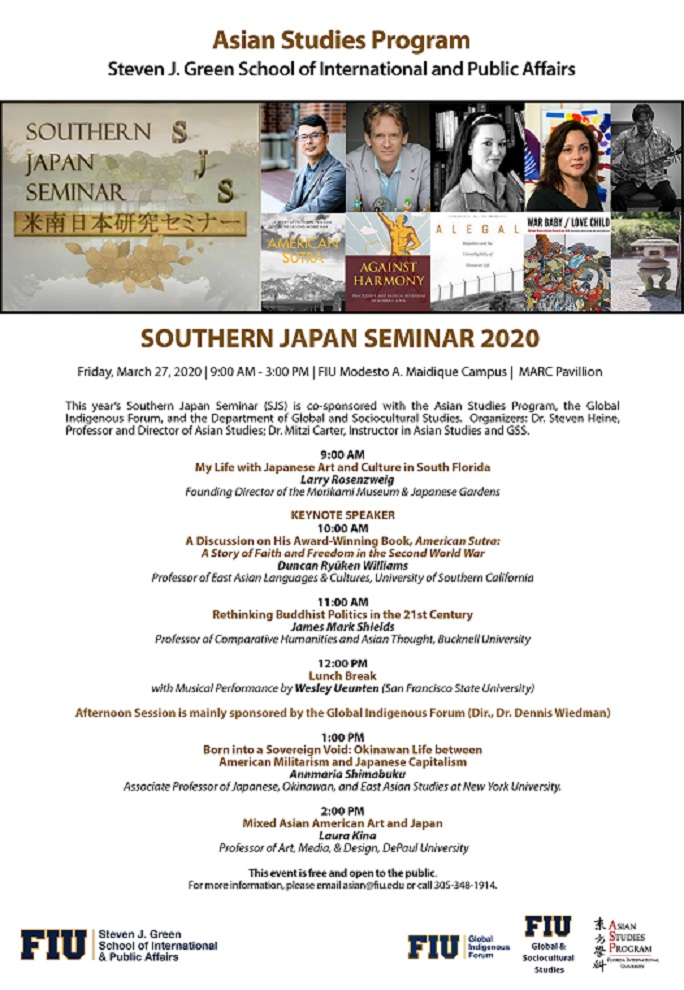
- Home
- Events
- 2020
- CANCELED - Okinawan Life, Arts, Identities and Sovereignty. Southern Japan Seminar 2020
CANCELED - Okinawan Life, Arts, Identities and Sovereignty. Southern Japan Seminar 2020
| Start: | |
|---|---|
| End: | |
| Venue: | MARC Pavilion. FIU Maidique Campus |
OKINAWAN LIFE, ARTS, IDENTITIES AND SOVEREIGNTY. SOUTHERN JAPAN SEMINAR 2020 Friday, March 27, 2019 9:00 AM - 3:00 PM. MARC Pavilion FIU Modesto A. Maidique Campus
The Southern Japan Seminar brings together scholars on the topics of Okinawan religion, arts, and identities. The Seminar flyer lists all of the morning and afternoon speakers. The afternoon sessions highlight the original peoples of Okinawa, their life ways, arts, music, identities and sovereignty issues.
This year's Southern Japan Seminar (SJS) is co-sponsored with the Asian Studies Program, the Global Indigenous Forum, and the Department of Global and Sociocultural Studies. Organizers: Dr. Steven Heine, Professor and Director of Asian Studies; Dr. Mitzi Carter, Instructor in Asian Studies and the Department of Global and Sociocultural Studies.
Free and open to the public. For full day program see Asian Studies events page: https:/asian.fiu.eduevents/
1:00 PM. Born into a Sovereign Void: Okinawan Life between American Militarism and Japanese Capitalism. Annmaria Shimabuku. Associate Professor of Japanese, Okinawan, and East Asian Studies at New York University.
Examines Okinawan identity trans-Pacifically, from the U.S., by way of mainland Japan, and to Okinawa itself, and pays particular attention to the historical conditions behind U.S.-Okinawan miscegenation. It shows the collaboration between the U.S. and Japan to erase the significance of Okinawan life.
What would it be like to be thought of as “Japanese American,” but intuit some sort of dissonance therein that could not always be verbalized? This can be the experience of living as a person of Okinawan descent in the U.S. or globally. Is it simply enough to claim the “correct” ethnicity? Or can this ambiguous condition open up the possibility of intuiting an alegality—that realm of existence that is both essential to and in excess of the law that keeps most identities grounded within the logic of internationally-recognized territories? This talk examines Okinawan identity trans-Pacifically, from the U.S., by way of mainland Japan, and to Okinawa itself, and pays particular attention to the historical conditions behind U.S.-Okinawan miscegenation. It shows the collaboration between the U.S. and Japan to erase the significance of Okinawan life as part of its project to erase the grave geopolitical consequence of concentrating U.S. military bases there. Similar to how military prisons in Guantanamo Bay function to produce death under the radar of international law, military bases in Okinawa produce lives unintelligible to the grammar of the nation-state system.
Annmaria Shimabuku is Associate Professor of Japanese, Okinawan, and East Asian Studies at New York University. She is author of Alegal: Biopolitics and the Unintelligibility of Okinawan Life published from Fordham University Press in 2019. She is a second-generation Okinawan of mixed ancestry.
2:00 PM. Okinawan Indigenous Identity and Imagination: Hajichi and “Holding On.” Laura Kina. Professor of Art, Media, & Design, DePaul University.
In the face of the continued physical and cultural occupation of Okinawa by mainland Japan and the US military, how might Okinawans (including Okinawans in the diaspora) re-envision their indigenous history and decolonize their imaginations? What are the stakes and risks of remembering, retelling, and representing indigenous stories in our contemporary world?
In this artist presentation, Laura Kina will discuss her 2019 series of paintings and drawings titled Holding On, which feature sacred, WWII memorial, and present-day military occupied sites in Okinawa, Japan. The works explore memory and affect through the genre of landscape painting. Kina was inspired to create this series about her ancestral homeland after observing the prop roots from banyan trees in Okinawa and how they keep holding on, regenerating and finding new routes to persist and reclaim the land around them. The works are also informed by the mythology of Kijimuna wood spirits and other Okinawan indigenous beliefs of spirit guardians of the land and sea.
Kina will also share her research on hajichi tattoos in her illustrated children’s book Okinawan Princess: Da Legend of Hajichi Tattoos (Bess Press, 2019). Okinawan Princess is written in Pidgin (Hawai‘i Creole) by Lee A. Tonouchi (aka Da Pidgin Guerrilla) and translated by Dr. Masashi Sakihara into Japanese and an Okinawan language called Uchinaaguchi. This trilingual feminist fairy tale set in contemporary and Territorial era Hawai‘i and Ryukyu Kingdom era Okinawa to illuminate an indigenous Okinawan tattoo tradition that pushes back against white and Japanese normative standards of beauty. The book draws from Kina and Lee’s own family histories as Okinawan sugar cane migrant laborers to Hawai‘i to tell a story that reframes Okinawan history and language as indigenous thus resisting Japan’s colonizing imperial narrative of claiming the Ryukyu Islands and people as part of Japan and as merely ethnic minorities of Japan who speak a dialect of Japanese.
Panel Discussant: Wesley Ueunten is a third generation Okinawan born and raised in Hawai’i. He lived in Okinawa and Japan for a total of 9 years. He received a PhD in Ethnic Studies from UC Berkeley in 2007 and is now a professor in Asian American Studies at San Francisco State University. For the past 25 years he has been active in the Okinawan American community in the Bay Area as an officer in the San Francisco Okinawa Kenjinkai and as an Okinawan musician. Uenten has published a large body of work on the Okinawan diaspora, militarization, and Oceanic/Indigenous struggles in relation to Okinawa. Ueunten will serve as the panel discussant and will open the afternoon session with a land acknowledgement and Okinawan song.
